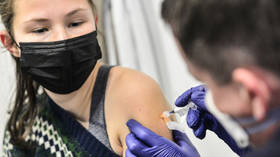WHO says ‘no evidence’ for boosting children & teens

There is currently no evidence that Covid-19 booster shots should be administered to healthy children and adolescents, the WHO’s top scientists said. The organization is still trying to work out the appropriate booster schedule.
“The aim is to protect the most vulnerable, to protect those at highest risk of severe disease and dying, those are our elderly population, immunocompromised with underlying conditions and also health care workers,” WHO chief scientist Dr. Soumya Swaminathan said at a news briefing on Tuesday, adding that “there’s no evidence right now” for administering them to otherwise healthy children and teens.
The WHO’s Strategic Advisory Group of Experts (SAGE) on Immunization will meet later this week to consider how governments should think about boosters, Swaminathan said.
Dr. Michael Ryan, the WHO’s executive director for health emergencies, said the organization hasn’t figured out yet how many doses people may ultimately need.
“I think people do have a certain fear out there that this booster thing is going to be like every two or three months and everyone’s going to have to go and get a booster. And I don’t think we have the answer to that yet,” Ryan said.
SAGE may eventually redefine how many doses will make up the “primary series” of shots, Ryan added, explaining that most healthy people may need just two, but the elderly or immunocompromised could require three or four.
Last week, the WHO’s Technical Advisory Group on Covid-19 Vaccine Composition (TAG-Co-VAC) said that a vaccination strategy “based on repeated booster doses of the original vaccine composition is unlikely to be appropriate or sustainable,” urging member countries to prioritize primary vaccinations for high-risk groups over universal boosting.
TAG-Co-VAC experts also said that current vaccines focus on reducing severe disease and protecting healthcare systems, while there is an ongoing need for vaccines that prevent infection and transmission of the virus.













